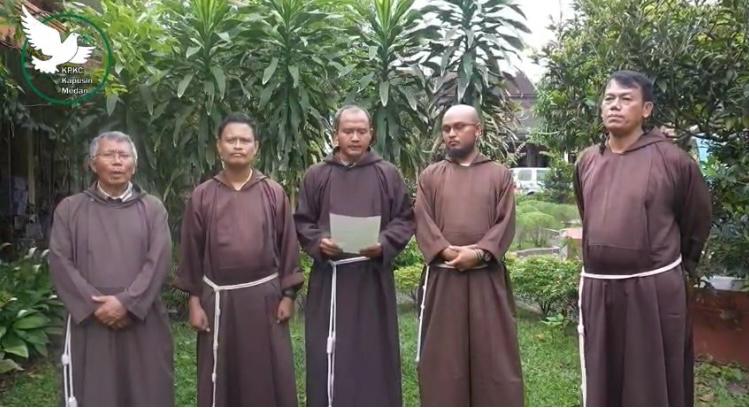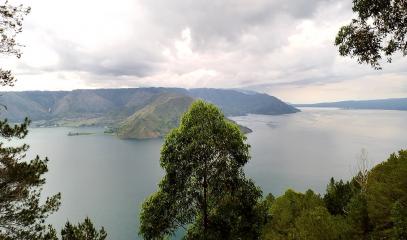Capuchins warn against environmental exploitation, defend indigenous rights in Lake Toba
The Justice, Peace and Integrity of Creation (JPIC) office of the Capuchins in Medan, North Sumatra, issued a strong appeal for the protection of the Lake Toba region. Speaking out against rising environmental exploitation and the threat to the rights of indigenous peoples, they ask the government to act and slam the devastation caused by business interests, in particular by Toba Pulp Lestari Tbk.
Medan (AsiaNews) – Faced with growing environmental exploitation in the Lake Toba region, the Justice, Peace and Integrity of Creation (JPIC) office of the Capuchins in Medan, North Sumatra, issued a statement on 3 June to all interested parties. In it, the friars reject all forms of environmental destruction and express their support for the rights of indigenous peoples.
Fr Sumitro Sihombing, an important member of the JPIC, expressed deep concern about the worsening environmental crisis.
“Justice, peace and integrity of creation are not just slogans; they are a way of life for which we must fight together. This Earth is our common home, and any form of exploitation against nature is a betrayal of our future generations,” he said.
The JPIC Capuchins in Medan, which is registered with Indonesia’s Ministry of Law and Human Rights, noted that the increase in floods, landslides, prolonged droughts, and land conflicts are direct consequences of exploitative activities that ignore the environmental balance.
In its statement, the JPIC strongly reiterated its commitment, calling for the conservation of the Lake Toba region and the rejection of all forms of exploitation of natural resources that threatens the integrity of nature.
In particular, the Capuchins stand against exploitative actions driven purely by business interests, disregarding social and environmental justice. They reject the presence of the businesses like the Toba Pulp Lestari Tbk, a pulp and paper company that has harmed local biodiversity.
The men religious also call on the government to protect the rights of indigenous communities who have long safeguarded nature through traditional knowledge and to end the intimidation of which they are victims.
Finally, the JPIC has petitioned the Supreme Court for the release of Sorbatua Siallagan, who was convicted for defending indigenous land rights.
Fr Sumitro Sihombing stressed that the indigenous Batak people are not obstacles to development, but custodians of age-old environmental values and wisdom.
“We call on all stakeholders to treat the Lake Toba region as a shared home that brings peace and prosperity, not as a conflict zone or a venue for the commodification of nature,” he explained.
The JPIC hopes that its statement will serve as a warning to all parties – government, industry, and civil society – to take moral responsibility for the protection and preservation of the Lake Toba region as a living heritage for future generations.
A local journalist shared with AsiaNews a disturbing account about the massive destruction of Lake Toba’s environment. “I speak as someone who has seen and experienced firsthand the ongoing destruction of the Lake Toba region over the past two or three decades,” they write.
“What we are facing is not only ecological devastation, but also the unravelling of the social and cultural fabric that once held the indigenous Batak community together.”
The journalist describes the gradual breakdown of social structures; traditional values like Dalihan Na Tolu (a complex system of Batak social relations and ceremonies) has vanished. Customary practices survive only as ceremonial formalities.
“This is not an academic exercise or rhetorical question by an NGO. This is a lived reality that we face every day: environmental destruction is all too visible.
“The once lush tropical forest has been replaced by eucalyptus monoculture, leading to a situation where artificial rain must be produced during the dry season, because the natural ecosystem has collapsed. Rivers have been degraded, lake biodiversity destroyed and endemic fish species extinct.
“People now have to buy cement to build huts because wood is no longer available as freely as it once was."
Lake Toba is not simply a tourist destination; it is a legacy for the people who have lived there for centuries.
"I write this not to condemn, but to remember: we all have a moral responsibility. The Church, the state, civil society, scholars, anyone with a conscience, must unite to defend Lake Toba, not only as an icon of ecotourism, but as a living home that deserves reverence and care," the journalist said.
The lake is located in the middle of the northern part of the island of Sumatra, at an altitude of about 900 metres. This body of water is about 100 kilometres long, 30 kilometres wide, and up to 505 metres deep, and is the largest lake in Indonesia and the largest volcanic lake in the world.
The Toba Caldera was recognised in July 2020 as a UNESCO geopark, one of 20 of its kind in the country.








.png)










